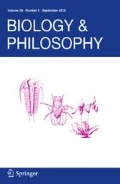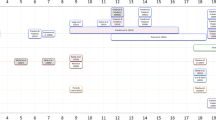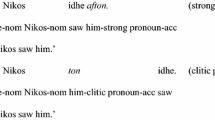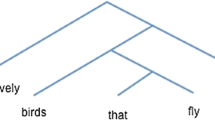Abstract
Nativists about syntactic processing have argued that linguisticprocessing, understood as the implementation of a rule-basedcomputational architecture, is spared in Williams syndrome, (WMS)subjects – and hence that it provides evidence for a geneticallyspecified language module. This argument is bolstered by treatingSpecific Language Impairments (SLI) and WMS as a developmental doubledissociation which identifies a syntax module. Neuroconstructivists haveargued that the cognitive deficits of a developmental disorder cannot beadequately distinguished using the standard gross behavioural tests ofneuropsychology and that the linguistic abilities of the WMS subject canbe equally well explained by a constructivist strategy of neurallearning in the individual, with linguisitic functions implemented in anassociationist architecture. The neuroconstructivist interpretation ofWMS undermines the hypothesis of a double dissociation between SLI andWMS, leaving unresolved the question of nativism about syntax. Theapparent linguistic virtuosity of WMS subjects is an artefact ofenhanced phonological processing, a fact which is easier to demonstratevia the associationist computational model embraced byneuroconstructivism.
Similar content being viewed by others
References
Baron-Cohen, S. and Tager-Flusberg, M. (eds): 2000, Understanding Other Words. Perspectives from Developmental Cognitive Neuroscience, OUP, Oxford.
Bellugi, U. and St George, M. (eds): 2000, Journey from Cognition to Brain to Gene. Perspectives from Williams Syndrome, MIT Press, Cambridge, MA.
Bellugi, U., Lichtenberger W., Jones W., Lai, Z. and Marie St George: 2000, ‘The Neurocognitive Profile of Williams Syndrome: A Complex Pattern of Strengths and Weaknesses’, in U. Bellugi and M. St George (eds) Journey from Cognition to Brain to Gene. Perspectives from Williams Syndrome, MIT Press, Cambridge, MA.
Deruelle, C., Mancini, J., Livet, M.O., Casse-Perrot, C. and de Schoen, S.: 1999, ‘Configural and Local Processing of Faces in Children with Williams Syndrome’, Brain and Cognition 41, 276-298.
Donnai, D. and Karmiloff-Smith, A.: 2000, ‘Williams Syndrome: From Genotype Through to Cognitive Phenotype’, American Journal of Medical Genetics: Seminars in Medical Genetics 97, 164-171.
Galaburda, A. and Bellugi, U.: 2000, ‘Cellular and Molecular Cortical Neuroanatomy in Williams Syndrome’, in U. Bellugi and M. St George (eds), Journey from Cognition to Brain to Gene. Perspectives from Williams Syndrome, MIT Press, Cambridge, MA.
Gerrans, P.: 2002, ‘Theory of Mind and Evolutionary Psychology’, Biology and Philosophy 17, 305-321.
Jones, K.L. and Smith: 1975, ‘The Williams Elfin Faces Syndrome: A New Perspective’, Journal of Paediatrics 86, 718-723.
Karmiloff-Smith, A.: 1998, ‘Development Itself Is the Key to Understanding Developmental Disorders’, Trends in Cognitive Sciences 2, 389-398.
Karmiloff-Smith, A., Scerif, G. and Ansari, D.: in press, ‘Double Dissociations in Developmental Disorders. Theoretically Misconceived, Empirically Dubious’, Cortex.
Laing, E., Butterworth, G., Ansari, D., Gsödl, M., Longhi, E. Panagiotaki, G., Paterson, S. and Karmiloff-Smith, A.: 2002, ‘Atypical Development of Language and Social Communication in Toddlers with Williams Syndrome’, Developmental Science 5, 233-246.
Leslie, A.: 1992, ‘Pretense, Autism and ‘Theory of Mind’ Module’, Current Directions in Psychological Science 1, 18-21.
McKusick, V.: 1998, Medlian Inheritance in Man: Catalogs of Autosomal Dominant, Autosomal Recessive and X-Linked Phenotypes, Johns Hopkins University Press, Baltimore.
Mills, D. Alvarez, T., Marie St George, Appelbaum, L., Bellugi, U. & Neville, H.: 2000, ‘Neurophysiological Amrkers of Face Processing in Williams Syndrome’, in U. Bellugi and M. St George (eds), Journey from Cognition to Brain to Gene. Perspectives from Williams Syndromeai, MIT Press, Cambridge, MA.
Oyama, S., Gray, R. and Griffiths, P. (eds): 2001, Cycles of Contingency. Developmental Systems and Evolution, MIT Press, Cambridge, MA.
Pinker, S.: 1999, Words and Rules, Weidenfield and Nicholson, London.
Quartz, S.R. and Sejnowski, T.J.: 1997, ‘The Neural Basis of Cognitive Development: a Constructivist Manifesto’, Brain and Behavioural Sciences.
Samuels, R.: in press, ‘Nativism in Cognitive Science’, Mind and Language.
Shallice T.: 1988, From Neuropsychology to Mental Structure, Cambridge University Press, Cambridge.
Thomas, M. and Karmiloff-Smith, A.: in press, ‘Are Developmental Disorders Like Cases of Adult Brain Damage? Implications from Connectionist Modelling’, Behavioural and Brain Sciences.
Thomas, M.S.C., Grant, J., Barham, Z., Gsödl, M., Laing, E., Lakusta, L., Tyler, L.K., Grice, S., Paterson, S. and Karmiloff-Smith, A.: 2001, ‘Past Tense formation in Williams Syndrome’, Language and Cognitive Process 16, 143-176.
Author information
Authors and Affiliations
Rights and permissions
About this article
Cite this article
Gerrans, P. Nativism and Neuroconstructivism in the Explanation of Williams Syndrome. Biology & Philosophy 18, 41–52 (2003). https://doi.org/10.1023/A:1023396800448
Issue Date:
DOI: https://doi.org/10.1023/A:1023396800448




